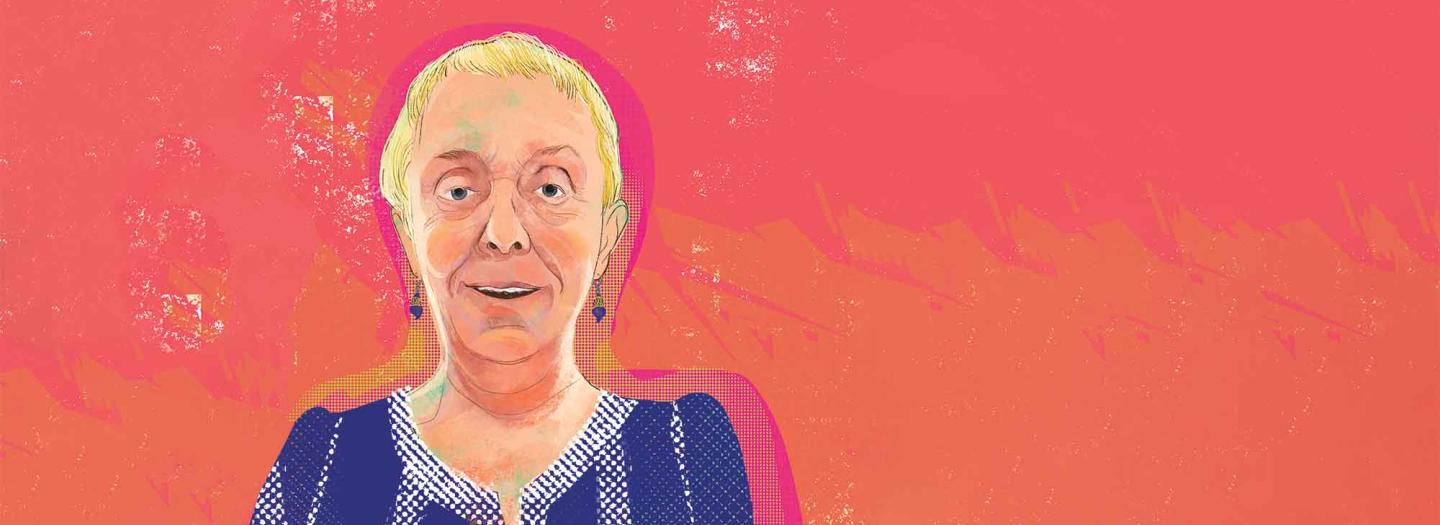Pamela Sutton, MD ’73 : Compassionate care at home and abroad
The UCSF Medical Alumni Association Board of Directors is honored to announce the 2023 Alumna of the Year: Pamela Sutton, MD ’73.

For many, palliative medicine seems too close to too much sorrow. Yet that’s the field Pamela Sutton, MD ’73, has spent most of her five-decade career pioneering, practicing, and teaching.
“When I’m asked why, the answer … is, we all die,” says Dr. Sutton, the 2023 UCSF School of Medicine Alumna of the Year, on the 50th anniversary of her graduation. “But if a palliative doctor is there to help you, you can have a much better life.”
Dr. Sutton has learned that working in palliative medicine with terminally ill patients takes faith – and a certain surrendering to reality.
“I have no illusions that I’m going to save them,” she says, “but if I can give them some comfort, if they can have good quality time with their family, some perspective and some peace, then I did something. That’s how I look at it. And, ultimately, I believe there’s an afterlife for everybody.”
“Dr. Sutton’s life has been one of service to those with the most advanced diseases, the most suffering,” says former classmate Janet L. Abrahm, MD ’73. “She was practicing palliative care for 20 years before it became a recognized specialty.”
Overcoming Obstacles
Her life’s first dream, growing up in Corning, N.Y., and Corona del Mar, Calif., was to play professional baseball. But Dr. Sutton eventually had to accept that it wasn’t possible.
“I recognized that if you were a boy, you had options that a girl didn’t have,” she says.
Her mother believed that she chose her fallback option – becoming a doctor – at age 7, perhaps influenced by her sister’s longtime battle with atopic dermatitis, which left the young girl with shredded, bleeding skin and led to sleepless nights for the whole family. Their parents became models for how to provide loving care.
“I think that had a big effect on me,” Dr. Sutton says. “I wanted somehow to make her better, and nobody else seemed to be able to do it.” She also contracted polio – at age 4 in 1952, two years before a vaccine was available – and “nobody knew anything about polio either.”
Dr. Sutton wore a leg brace for a decade, but that didn’t stop her from pursuing her purpose. As an adolescent, she read about the humanitarian work of Albert Schweitzer in Africa and Thomas Dooley in Asia and felt moved; she marks it as a moment that pointed her toward palliative care.
“I was very affected by that outreach that they had, that spiritual outreach. I liked the idea of this kind of service,” she says.
Spirit of Service
For her undergraduate education, Dr. Sutton attended Pomona College in Claremont, Calif. She chose UCSF in part because a family friend had called it “ the Harvard of the West.”
She would enter the UCSF School of Medicine with an exceptional class. “We were pioneers,” she says. “There were 20 women in that class. It was in 1969. That was an enormous number of women for a medical school class.”
Dr. Sutton also notes that it was a stellar year for progress in diversity. Medical students from many backgrounds worked side by side and got to know each other as fellow human beings. “It was a complicated but uplifting time,” she says.
The three other women she lived with at Millberry Union were especially important to her experience: Dr. Abrahm; Susan Bennett, MD ’73; and Connie Yamaguchi Choy, MD ’73.
“I call us the Four Musketeers,” Dr. Sutton says.
At graduation, she received UCSF’s Gold-Headed Cane, awarded by faculty members and students to a graduate imbued with the spirit of service.
Dr. Sutton did a three-year family medicine residency at the University of Rochester. Then, with an eye on international work, she completed training in tropical medicine and hygiene at the University of London. Later, she spent time observing at groundbreaking hospices in London and launched a hospice program in southern Florida. A pillar of palliative care there for decades, Dr. Sutton eventually became director of palliative care services for the North Broward Hospital District and trained 10 fellows in palliative medicine who have gone on to influence the field themselves.
Dr. Sutton’s influence over five decades has spanned multiple continents. In addition to a medical service trip to Ethiopia, she has made significant contributions to palliative care and training in Pakistan and India, working privately and with the World Health Organization.
Now, as her career focuses on palliative care in Pakistan, she is being honored for a lifetime dedicated to compassionate service.
“Being named Alumna of the Year is like the second half of the Gold-Headed Cane,” she says. “Palliative care has given my medical work meaning. I am grateful for UCSF and the medical students, faculty members, and friends who have helped me find this path and are graciously blessing me with this award.”